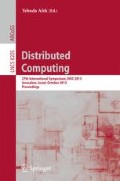Abstract
Consider a group of nodes connected through multiple-access channels and the only observable feedback on the channel is a binary value: either one or more nodes have transmitted (busy), or no node has transmitted (idle). The channel model thus described is called Beeping Model and captures computation in hardware using a group of sequential circuit modules connected by a logic-OR gate. It has also been used to study chemical signaling mechanisms between biological cells and carrier-sensing based wireless communication.
In this paper, we study the distributed complexity of two fundamental problems in the Beeping Model. In both problems, there is a set of nodes each with a unique identifier i ∈ {1,2,…,n}. A subset of the nodes A ⊆ {1,2,…,n} is called active nodes. In the Membership Problem, every node needs to find out the identifiers of all active nodes. In the Conflict Resolution Problem, the goal is to let every active node use the channel alone (without collision) at least once.
We derive two results that characterize the distributed complexity of these problems. First, we prove that in the Beeping Model the two above problems are equally hard. This is in stark contrast to traditional channel models with ternary feedback in which the membership problem is strictly harder than conflict resolution. The equivalence result also leads to a randomized lower bound for conflict resolution, which shows a relative powerlessness of randomization in the beeping model. Secondly, we give a new deterministic algorithm for the problems that achieves the best known parallelization among all practical algorithms.
Access this chapter
Tax calculation will be finalised at checkout
Purchases are for personal use only
Preview
Unable to display preview. Download preview PDF.
References
Afek, Y., Alon, N., Bar-Joseph, Z., Cornejo, A., Haeupler, B., Kuhn, F.: Beeping a maximal independent set. In: Peleg, D. (ed.) DISC 2011. LNCS, vol. 6950, pp. 32–50. Springer, Heidelberg (2011)
Afek, Y., Alon, N., Barad, O., Hornstein, E., Barkai, N., Bar-Joseph, Z.: A biological solution to a fundamental distributed computing problem. Science 331(6014), 183–185 (2011)
Capetanakis, J.: Tree algorithms for packet broadcast channels. IEEE Transactions on Information Theory 25(5), 505–515 (1979)
Clementi, A.E.F., Monti, A., Silvestri, R.: Selective families, superimposed codes, and broadcasting on unknown radio networks. In: Proceedings of the Twelfth Annual ACM-SIAM Symposium on Discrete Algorithms, SODA 2001 (2001)
Cornejo, A., Kuhn, F.: Deploying wireless networks with beeps. In: Lynch, N.A., Shvartsman, A.A. (eds.) DISC 2010. LNCS, vol. 6343, pp. 148–162. Springer, Heidelberg (2010)
Du, D., Hwang, F.: Combinatorial group testing and its applications. World Scientific (2000)
Gelly, S., Kocsis, L., Schoenauer, M., Sebag, M., Silver, D., Szepesvári, C., Teytaud, O.: The grand challenge of computer go: Monte carlo tree search and extensions. Commun. ACM 55(3), 106–113 (2012)
Greenberg, A.G., Winograd, S.: A lower bound on the time needed in the worst case to resolve conflicts deterministically in multiple access channels. J. ACM 32(3) (July 1985)
Hayes, J.: An adaptive technique for local distribution. IEEE Transactions on Communications 26(8), 1178–1186 (1978)
Komlos, J., Greenberg, A.: An asymptotically fast nonadaptive algorithm for conflict resolution in multiple-access channels. IEEE Transactions on Information Theory 31(2), 302–306 (1985)
Kowalski, D.R.: On selection problem in radio networks. In: Proceedings of the Twenty-Fourth Annual ACM Symposium on Principles of Distributed Computing, PODC 2005 (2005)
Li, C.H.: A sequential method for screening experimental variables. Journal of the American Statistical Association 57(298), 455–477 (1962)
Martel, C.U.: Maximum finding on a multiple access broadcast network. Information Processing Letters 52, 7–13 (1994)
Massey, J.L.: Collision-resolution algorithms and random-access communications. Technical Report UCLA-ENG-8016 (April 1980)
Tsybakov, B.S., Mikhailov, V.A.: Free synchronous packet access in a broadcast channel with feedback. Prob. Inf. Transmission 14(4) (April 1978)
Wolf, J.K.: Born again group testing: Multiaccess communications. IEEE Transaction on Information Theory 2 (March 1985)
Author information
Authors and Affiliations
Editor information
Editors and Affiliations
Rights and permissions
Copyright information
© 2013 Springer-Verlag Berlin Heidelberg
About this paper
Cite this paper
Huang, B., Moscibroda, T. (2013). Conflict Resolution and Membership Problem in Beeping Channels. In: Afek, Y. (eds) Distributed Computing. DISC 2013. Lecture Notes in Computer Science, vol 8205. Springer, Berlin, Heidelberg. https://doi.org/10.1007/978-3-642-41527-2_22
Download citation
DOI: https://doi.org/10.1007/978-3-642-41527-2_22
Publisher Name: Springer, Berlin, Heidelberg
Print ISBN: 978-3-642-41526-5
Online ISBN: 978-3-642-41527-2
eBook Packages: Computer ScienceComputer Science (R0)

